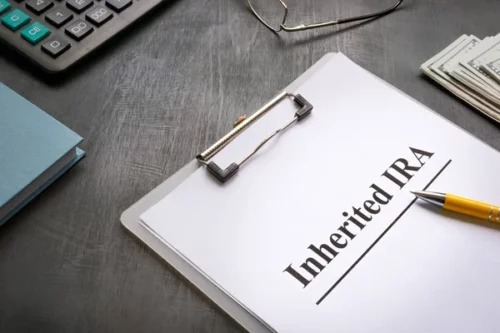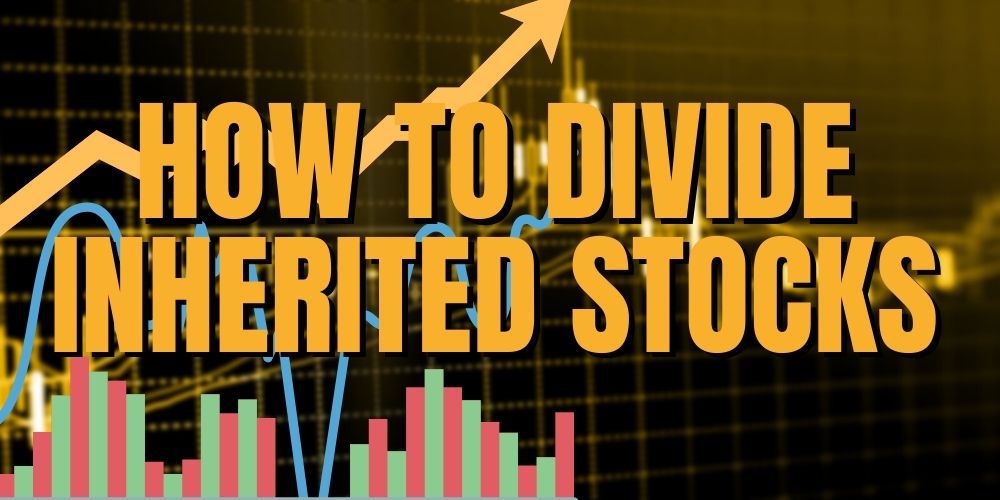It is fairly easy to understand how cash or other investments are distributed among inheritors of an estate, but what about shares? How are inherited stocks divided between the recipients, and what is the inheritance tax calculation? We checked it out, and below is the answer.
What Happens When You Inherit Stocks?
Inherited stock is equities or shares received by an individual as part of the estate bequeathed upon them by a deceased person.
When shares are inherited, the price appreciation between the time of the original purchase and the death of the owner does not get taxed.
Instead, their “cost basis,” or the value which the IRS considers for taxation, gets reset to that on the date of the original owner’s death.
All the inheritors need to do is provide details like a death certificate, probate court order, proof of identity, and other valid documentation.
Once this is done, the stocks can be moved into their account.

Due to the rule we outline above, the new owners potentially get a significant tax exemption.
We will talk more about this advantage in the article below.
If you want to understand the process of how shares can be distributed and transferred to the inheritors, those aspects will also be covered later.
Lastly, the implications of cashing out or selling such securities are something that will be discussed toward the end here today.
Examples of Inherited Stock
Let us assume that a person purchases a security priced at $20.
By the time they die, the value reaches $100.
As per what we stated above, the inheritor does not pay tax on the $80 difference.
Instead, they only get taxed for any further gains once they receive the securities.
Thus, if the stock is finally sold at $120, the capital gains taxes will only be levied on the $120 – $100 = $20 appreciation.
Assuming the person is at a 15% tax slab, that’s a benefit of 15% * ($100 – $20) = $12 per share.
How To Divide Inherited Stocks Amongst Beneficiaries
The best practice when trying to split such an inheritance is to avoid becoming a financial advisor.
Do not try to see what would be best from a tax perspective for each individual.
Instead, distribute the wealth as fairly as possible. Afterward, all parties can decide the right course for their own inherited securities.
Let’s consider an example to explain.

Firstly, an inheritance in the stock market could entail several asset classes.
Each type may have its own issues regarding lot sizes, capital gains taxes, and so on.
Suppose the estate to be distributed names three parties A, B, and C, as inheritors.
Moreover, the deceased has instructed to give an equal percentage to all of them.
The assets under consideration are as follows:
- 1,000 stocks of XYZ bought in two lots:
- 500 shares purchased six years ago @ $8 and
- The remaining taken one year prior @ $20.
- 249.5 units of mutual funds MF @ $50 each.
- 500 ETF E stocks @ $70 per unit.
Starting off with the securities.
The two lots of 500 shares each should be divided equally into three persons.
Therefore, 166 of them from either time period (6 years ago and one year ago) should be given to all three inheritors.
That leaves two stocks, one from either lot.
Since the capital gains during the lifetime of the original owner are not taxed, the stocks in either lot are equivalent from a tax perspective.
Hence, if they are currently trading at $25, then any two parties can get one share each, and the equivalent amount in cash can be given to the third.
Next, the mutual fund units can also be divided equally among the three persons.
A and B will receive 83.167 units, while C can be given 83.166 and the equivalent of 0.01 units of the fund in cash.
Lastly, the division of ETF shares would work exactly like that of securities.
How Do You Transfer Inherited Stock?
If the original owner chose a transfer-on-death beneficiary, they could get the shares seamlessly.
However, that’s not always the case.
If the deceased did not opt to designate such a person, the distribution to all beneficiaries would happen as per instructions in their estate plan.
For example, if they choose to create a trust, the trustee needs to produce a declaration to that effect and take over the proceedings of the transfer.
On the other hand, if just a Will was created, the executor would take care of these details.

They need a probate court to give them a Letter of Testamentary.
If the inheritance was below a certain threshold, a small estate affidavit is required instead.
Once all of this is complete, their task becomes to distribute the assets to the inheritors.
The executor will prepare the necessary documentation for the appropriate authorities, including death certificates, identity cards of inheritors, and so on.
Once all these formalities are completed, the shares can simply move from the deceased’s account to that of the inheritors.
Do You Have to Pay Taxes on Inherited Stock?
No, taxes are not to be paid on the inherited stock received through a taxable account.
Many people think that if the original cost basis was $50 and the beneficiary inherits it at $100, then they need to pay taxes on the difference ($100 – $50).
In fact, when stocks in a taxable account are received by inheritors, they get a”step up” in basis.
This means that for tax purposes, the price is reset to the fair market value of the equity as of the date of death of the person who conferred them.
In the above example, the inheritor receives the shares at a cost basis of $100, not $50.
Moving forward, their tax liability would only be on any gains made over and above $100.
An important point to note is that this rule takes away any tax deduction benefit due to losses in the deceased’s portfolio.
The inheritor cannot offset gains from other investments using them.
Lastly, there is one exception to this rule.
For an inheritance higher than $11.7 Mn per person and $23.4 Mn per couple, federal estate taxes may be applicable.
Tax Deferred Account
Taxation works differently for tax-deferred accounts like a traditional IRA or a 401(k).
In this case, the portfolio received shall be taxable, but it is possible to defer the hit from Uncle Sam.
For spouses, the simplest thing to do is to roll the money into their own tax-deferred account and postpone its distributions.
This can be done till the age of 70.5.
For other inheritors, the process is different — they need to open an inherited IRA.

Note that taking a check and depositing it into this new entity would be considered a distribution and hence instantly taxable.
The original tax-deferred account needs to be rolled directly into this one for the recipient to get benefits.
After the process is complete, the inherited must take annual distributions and, of course, also pay the taxes on it.
These will vary depending on age and income.
It is important to note that the first distribution has to be taken by the end of the year in which the original holder died.
Otherwise, the law requires the beneficiary to deplete the entire inherited IRA within the next five years.
Should I Sell Inherited Stock?
The decision to sell or hold the inherited stock is entirely upon the beneficiary.
The shares belong to them exactly like any other holdings they may carry.
As far as taxes are concerned, we explained the treatment earlier.
The sale of such securities would consider the cost basis as the price on the day when the deceased perished and calculate the rates accordingly.
Lastly, if the inherited believes that stock might have long-term potential, there may be some merit in holding on to it.
However, if they are in need of the money instead, there should be no problem in selling off the inheritance immediately.
How Do You Cash Out Inherited Stock?
Again, cashing out is not something the inherited should be concerned with.
The decedent would have appointed an executor to take care of this. Their task is to present the Will, insure the assets, distribute them, etc.
Cashing out or distributing stock also falls under their purview.
If no such executor has been appointed, then the inheritors must appoint one through mutual consensus.
Once finalized, all parties must agree to the decisions of this person.
Final Words
No one likes paying taxes, and when they are related to money that has come in the form of an inheritance, it can be even more painful.
Thankfully, securities received in taxable assets receive a major step up in basis when they come to the inheriter.
While it is a huge advantage to the beneficiary, it also makes the distribution of such stocks much easier.
Since there is no tax implication, the executor of the estate can concentrate on simply dividing up the shares as fairly as possible.
There is one minor exception – that of the estate tax levied on very large inheritances.
Lastly, tax-deferred accounts work differently, however, and we have shown above how to best defer the liability for inheritors.


 Tags:
Tags:










